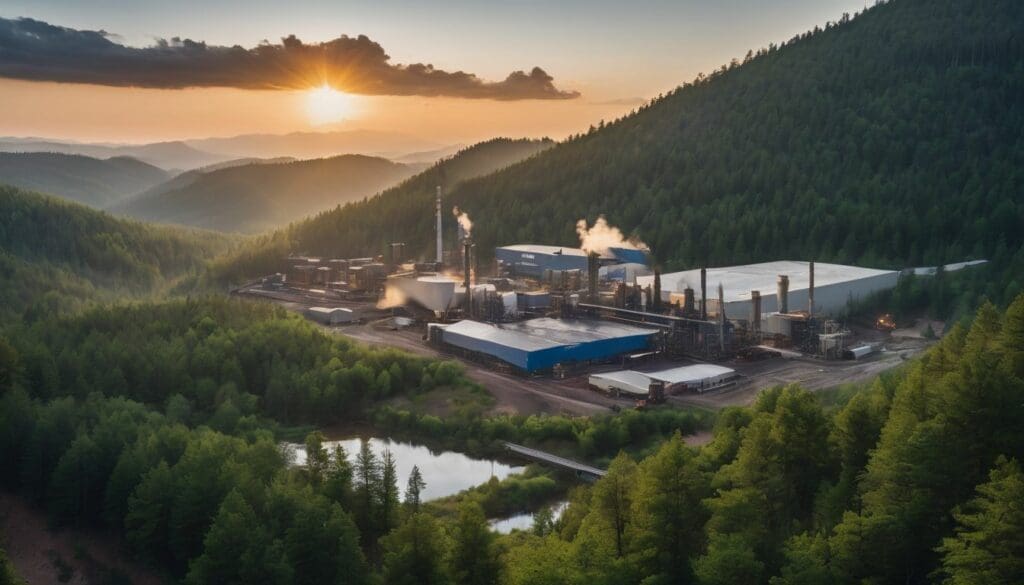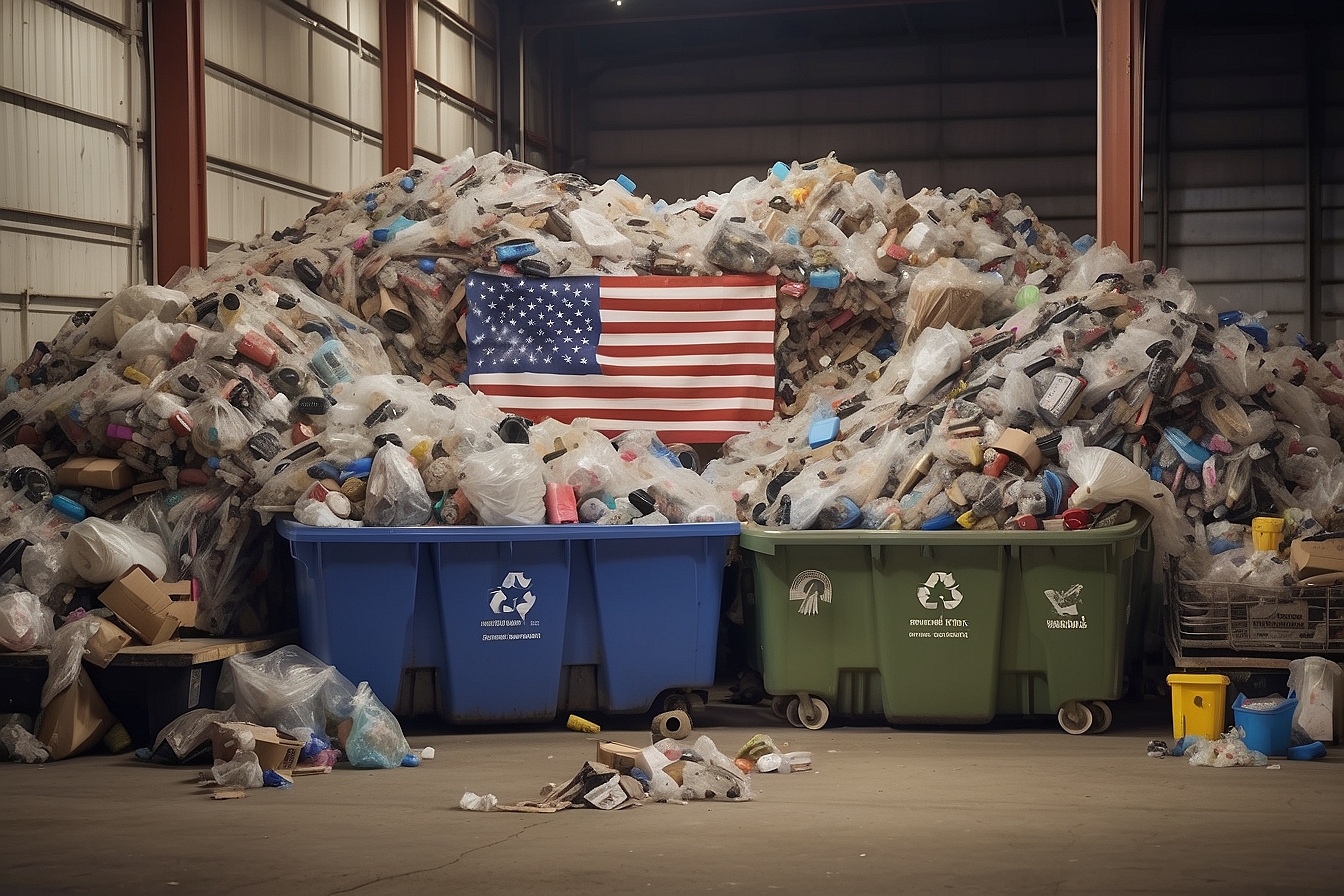The mounting issue of waste accumulation in our neighbourhoods and its consequential toll on the environment is something we all keenly feel. It’s a concern that sits heavily on our hearts, but there’s a glimmer of hope on the horizon.
Recent studies have shone a light on the fact that for every tonne of waste we recycle, we can prevent 1.3 tonnes of carbon emissions from entering our atmosphere—a heartening figure indeed.
We’re here to offer guidance and insight into how governments across the globe are rising to meet this environmental challenge with determination and strategic action. Join us as we explore the empowering role policy can play in forging a path towards a more sustainable future—one where cleaner communities thrive under the careful stewardship of those who hold them dear.
Key Takeaways
- Governments are vital in reducing waste by introducing policies and regulations that guide good environmental practices among individuals and businesses.
- Investment in waste treatment infrastructure, like recycling plants, is a government strategy to handle waste responsibly and protect our planet.
- Educating the public through campaigns and school programs helps raise awareness about the importance of recycling and reusing materials for a sustainable future.
- Monitoring compliance with waste management rules ensures that everyone follows the guidelines set to reduce pollution and conserve natural resources.
- By focusing on research into new ways to deal with rubbish, governments can find innovative solutions to keep our environment cleaner.
What is Waste Reduction and Why is it Important?
Waste reduction means cutting down on the amount of rubbish we create, aiming for a ‘zero waste’ lifestyle that preserves natural resources and reduces pollution. It’s about making smart choices to minimise what ends up in landfills or incinerators.
We think of it not just as recycling but as rethinking our consumption habits – choosing reusable items over disposable ones, repairing instead of discarding, and considering products’ life cycles before purchase.
Reducing waste is critical because it directly tackles climate change by lowering greenhouse gas emissions from decomposition and burning. It also conserves energy and resources vital for sustainable development.
And let’s not forget – less rubbish means less toxic runoff into our waterways, keeping our environment cleaner for us all. As environmentally conscious individuals know well, embracing waste reduction isn’t just good practice; it’s a necessary step towards preserving our planet’s future health and the well-being of generations to come.
Government’s Role in Waste Reduction
The government plays a crucial role in waste reduction through the development and implementation of policies, regulations, and infrastructure for effective waste management. They also focus on education, enforcement, research, innovation, and collaboration to achieve zero waste goals.
Policy development and regulation
- Setting clear waste management policies to guide businesses and individuals in sustainable waste practices.
- Enforcing regulations that promote recycling, proper waste disposal, and the use of eco – friendly materials.
- Implementing solid waste management regulations to control pollution and protect the environment.
- Creating pre – incident waste management planning to minimise the impact of potential environmental disasters.
- Developing zerowaste strategies that encourage resource conservation and circular economy principles.
- Establishing communication channels between government levels to coordinate effective waste reduction efforts.
Infrastructure development
Governments invest in waste treatment plants and recycling initiatives to support waste reduction strategies. Waste treatment infrastructure is crucial for effective pre-incident waste management planning and zero-waste measures.
By developing green initiatives, they contribute to greenhouse gas reduction and climate change mitigation. Local governments play a key role in ensuring effective communication between government levels for environmental protection.
Renewable energy projects are also part of the infrastructure development to support recycling programmes and pollution control efforts. Governments focus on building sustainable infrastructure to promote waste reduction while fostering collaboration with private sectors for innovative solutions.
Education and awareness
As environmentally conscious individuals, we believe that education and raising awareness are crucial in waste reduction efforts. These strategies play a vital role in cultivating sustainable habits and fostering a sense of responsibility towards waste management.
- Public Education Campaigns: Implementing widespread educational initiatives to inform citizens about the impact of waste on the environment and the importance of adopting sustainable practices.
- School Programmes: Introducing waste reduction programmes in schools to educate students about the significance of reducing, reusing, and recycling materials.
- Community Workshops: Organising workshops and seminars to engage communities in discussions about effective waste management strategies and sustainable living.
- Promote Behavioural Change: Encouraging responsible consumer behaviour through informative campaigns aimed at reducing single-use plastics and increasing recycling rates.
- Collaboration with Media: Partnering with media outlets to disseminate information on waste reduction measures, showcasing success stories, and promoting environmental consciousness.
- Advocacy for Green Practices: Encouraging businesses and industries to adopt eco-friendly practices through educational campaigns highlighting the benefits of renewable energy and zero-waste measures.
Monitoring and enforcement
When it comes to waste reduction, monitoring and enforcement play a crucial role in ensuring that government waste management policies are effective. Here’s how governments monitor and enforce waste reduction measures:
- Implementing regular inspections of waste disposal facilities to ensure compliance with regulations.
- Enforcing penalties for non – compliance with waste reduction laws to deter illegal dumping and improper waste disposal.
- Utilising surveillance technology such as cameras and sensors to monitor and track waste generation, collection, and disposal activities.
- Conducting audits and assessments to evaluate the effectiveness of waste reduction initiatives and identify areas for improvement.
- Collaborating with law enforcement agencies to crack down on illegal dumping and other environmental violations.
- Engaging the public through awareness campaigns about the importance of proper waste management practices and the consequences of non-compliance.
Research and innovation
Governments play a crucial role in waste reduction through research and innovation. By investing in new technologies and processes, they can develop more efficient methods for recycling and waste management.
Through pioneering research, governments can discover better ways to reduce, reuse, and recycle materials, contributing to the global efforts for zero-waste measures. This active involvement in seeking innovative solutions is vital for addressing environmental concerns while promoting sustainability.
Innovative research by governments also leads to the development of eco-friendly products and packaging that are essential for reducing overall waste generation. These advancements contribute significantly to achieving zero-waste measures as part of conservation and environmental protection efforts.
Collaboration and partnerships
After conducting thorough research and fostering innovation, it is imperative for governments to collaborate and form partnerships with various stakeholders. By working together with businesses, non-profit organisations, and local communities, we can align our efforts towards waste reduction initiatives.
Through these collaborations and partnerships, we can share resources, knowledge, and best practices to collectively address the challenges of waste management. These collaborative efforts ensure a more cohesive approach in implementing zero-waste measures on a broader scale.
Furthermore, collaboration and partnerships enable a diversified pool of expertise which can lead to innovative solutions for waste reduction. Working together not only fosters a sense of collective responsibility but also allows for the pooling of resources necessary for successful waste reduction strategies.
Conclusion
Government plays a crucial role in waste reduction through policy development and regulation. Infrastructure development facilitates efficient waste management. Education and awareness campaigns promote responsible waste disposal among citizens.
Monitoring and enforcement ensure compliance with waste reduction measures, fostering a sustainable environment. Research and innovation drive the implementation of effective zero-waste measures, while collaboration and partnerships amplify the impact of government efforts.
FAQs
1. What does the government do to reduce waste?
Governments implement zero-waste measures and create laws that encourage people and businesses to produce less rubbish.
2. Can the government help us recycle more?
Yes, governments can provide recycling facilities and teach communities how to recycle effectively as part of their role in waste reduction.
3. Why is it important for governments to be involved in waste reduction?
It’s important because they have the power to make big changes that can lower the amount of waste our cities create, keeping our environment cleaner.
4. Do governments work alone on reducing waste?
No, they often team up with organisations, businesses, and citizens to come up with better ways to cut down on rubbish together.





